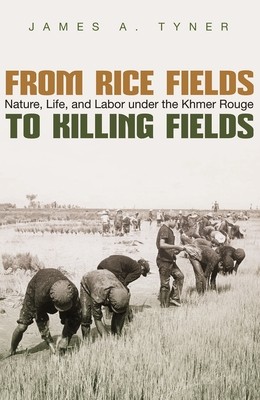
- We will send in 10–14 business days.
- Author: James A Tyner
- Publisher: Syracuse University Press
- ISBN-10: 0815635419
- ISBN-13: 9780815635413
- Format: 15.8 x 22.6 x 1.6 cm, minkšti viršeliai
- Language: English
- SAVE -10% with code: EXTRA
Reviews
Description
Between 1975 and 1979, the Communist Party of Kampuchea fundamentally transformed the social, economic, political, and natural landscape of Cambodia. During this time, as many as two million Cambodians died from exposure, disease, and starvation, or were executed at the hands of the Party. The dominant interpretation of Cambodian history during this period presents the CPK as a totalitarian, communist, and autarkic regime seeking to reorganize Cambodian society around a primitive, agrarian political economy.
From Rice Fields to Killing Fields challenges previous interpretations and provides a documentary-based Marxist interpretation of the political economy of Democratic Kampuchea. Tyner argues that Cambodia's mass violence was the consequence not of the deranged attitudes and paranoia of a few tyrannical leaders but that the violence was structural, the direct result of a series of political and economic reforms that were designed to accumulate capital rapidly: the dispossession of hundreds of thousands of people through forced evacuations, the imposition of starvation wages, the promotion of import-substitution policies, and the intensification of agricultural production through forced labor. Moving beyond the Cambodian genocide, Tyner maintains that it is a mistake to view Democratic Kampuchea in isolation, as an aberration or something unique. Rather, the policies and practices initiated by the Khmer Rouge must be seen in a larger, historical-geographical context.EXTRA 10 % discount with code: EXTRA
The promotion ends in 21d.20:04:37
The discount code is valid when purchasing from 10 €. Discounts do not stack.
- Author: James A Tyner
- Publisher: Syracuse University Press
- ISBN-10: 0815635419
- ISBN-13: 9780815635413
- Format: 15.8 x 22.6 x 1.6 cm, minkšti viršeliai
- Language: English English
Between 1975 and 1979, the Communist Party of Kampuchea fundamentally transformed the social, economic, political, and natural landscape of Cambodia. During this time, as many as two million Cambodians died from exposure, disease, and starvation, or were executed at the hands of the Party. The dominant interpretation of Cambodian history during this period presents the CPK as a totalitarian, communist, and autarkic regime seeking to reorganize Cambodian society around a primitive, agrarian political economy.
From Rice Fields to Killing Fields challenges previous interpretations and provides a documentary-based Marxist interpretation of the political economy of Democratic Kampuchea. Tyner argues that Cambodia's mass violence was the consequence not of the deranged attitudes and paranoia of a few tyrannical leaders but that the violence was structural, the direct result of a series of political and economic reforms that were designed to accumulate capital rapidly: the dispossession of hundreds of thousands of people through forced evacuations, the imposition of starvation wages, the promotion of import-substitution policies, and the intensification of agricultural production through forced labor. Moving beyond the Cambodian genocide, Tyner maintains that it is a mistake to view Democratic Kampuchea in isolation, as an aberration or something unique. Rather, the policies and practices initiated by the Khmer Rouge must be seen in a larger, historical-geographical context.

Reviews